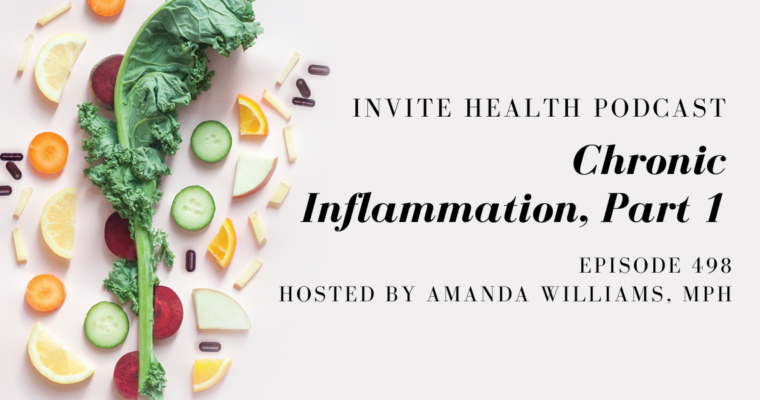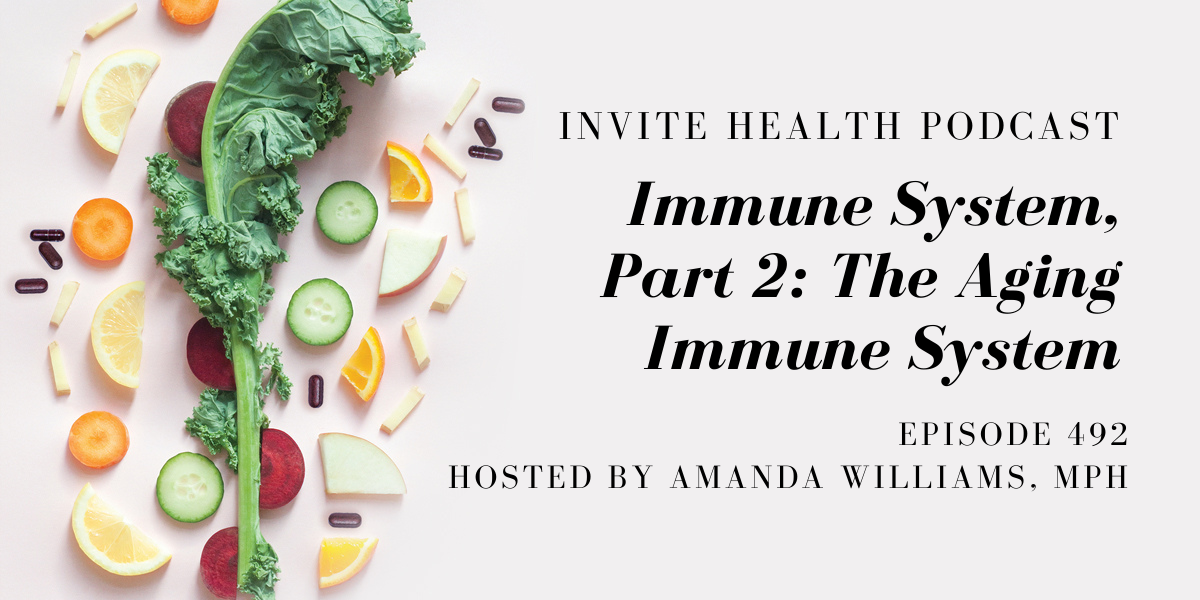Subscribe Today!
Please see below for a complete transcript of this episode.
Immune System, Part 2: The Aging Immune System – InViteⓇ Health Podcast, Episode 492
Hosted by Amanda Williams, MPH
*Intro music*
InVite Health Podcast Intro: Welcome to the InViteⓇ Health Podcast, where our degreed healthcare professionals are excited to offer you the most important health and wellness information you need to make informed choices about your health. You can learn more about the products discussed in each of these episodes and all that InViteⓇ Health has to offer at www.invitehealth.com/podcast. First time customers can use promo code PODCAST at checkout for an additional 15% off your first purchase. Let’s get started!
*Intro music*
Amanda Williams, MPH: [00:00:40] Now that we’ve gone through and we’ve looked at both the innate and the adaptive immune system and understanding the complexity of how our immune system is working to protect us, now we have to look at the double edged sword in a sense of the immune system and understanding what immunosenescence is. One of the key components or actions of our innate or that immediate immune response is inflammation, which is good in one sense, but can be very damaging in another. And understanding that when our body has any type of illness or injury that the immune system starts to drive up this inflammation. So this is when we can start to look at those cytokines and look at neutrophils in different interleukins and tumor necrosis factor alpha. All of these things that we know are going to drive inflammation. And it’s one thing if we have acute inflammation, it’s another thing with if we have chronic inflammation. So inflammation and the immune system are directly related because it is the immune system that’s actually controlling that inflammation. And this is where immunosenescence is so critical to understanding… Just defining it, but then also understanding how this links in to the way that our body ages and our immune system’s deactivation or dysfunction that occurs as we get older.† [00:02:14]
[00:02:14] So I’m Amanda Williams, MD, MPH. And this is part two. We are going to be talking about immunosenescence. This is… Basically it’s a deterioration of the immune system that occurs during aging. So over time, our ability to fight off different pathogens, whether that be a bacteria or viruses, or just even respond to any type of an injury, which would then require an acute inflammatory response and when we think about wound healing, that this can be delayed. This is all a hallmark of the, the aging process. So what happens is that you have this delay in how the immune system reacts in terms of that inflammatory response. But then when it does, then we end up with this persistent chronic inflammation, which is incredibly problematic. Now we can see this especially in the setting of when people get older and how they are more prone to taking longer to heal from an injury or taking longer to recover from, say, the common cold, or they are just more susceptible to even developing the common cold. I’m just using that just as an example.† [00:03:36]
[00:03:37] But we know that there’s many other components to the aging immune system that impacts our health. There was a study that came out and was published in the International Journal of Cardiology, close to a decade ago now, talking about immunosenescence and inflammation, how this was a characteristic they were seeing in patients who had chronic heart failure. They were able to look at the inflammatory status of these individuals and look at their high levels of cytokines. And what their hypothesis was was that patients who had chronic heart failure could develop this immunosenescence in a more rapid rate due to this chronic inflammation. And so through this particular research study, they were able to look specifically at those different cells of the immune system and looking at their natural killer cells and looking at their interleukin levels and looking at T cells. They were surprised by how many areas of the immune system were actually implicated in this immunosenescence effect in these patients who had heart failure. They found a much higher degree of immunosenescence than their healthy, age matched controls, so meaning you take someone who’s 70 years old and they had heart failure, you take another 70-year-old and who doesn’t have heart failure. What they were able to to see was that cell differentiation between those two groups, the healthy 70 year old and the unhealthy 70 year old. They both had diminished levels of immune response, but those who had heart failure had significantly diminished response with this really high level of systemic inflammation that was occurring. So when I talk about heart disease, oftentimes I always say we focus so much and we have for so many years on cholesterol and cholesterol is the enemy. But what we actually know to be the case is that when there’s damage done to the vascular lining and the immune system is trying to go in and heal and repair, that that drives that sustained inflammation over time. And it’s that inflammation that is the true causative reason for all of the progression in heart disease.† [00:06:14]
[00:06:15] And so we see this in immunosenescence as well. So thinking about inflammation, understanding that this is the immune system’s response and oftentimes it’s a very welcomed response. Unfortunately, through the process of the delayed innate immunity as well as impact on adaptive because you even see this as people get older, their response to vaccinations usually is diminished. So say you have someone who has underlying health conditions and they get the annual flu vaccine or they get the, you know, pneumococcal vaccine and then they still get sick. And the problem is, is that because of that immunosenescence, because the immune system is less responsive than it was when they were 20 years old, that the body’s ability to react accordingly to that vaccination is not where it needs to be. So… And this is a whole nother area of immune system science and trying to to see how passive immunity is actually working when you understand, like, the hallmark signs of passive and active immunization. So we know that immunosenescence is certainly a component that we can, you know, tie in to that.† [00:07:48]

[00:07:49] So back to immunosenescence, you know, there’s many different things that are actually occurring. So once again, many moving parts. So we have this decline in the production of key immune cells that happens as we get older. So we see this in T-cell production. So when we think about what the action or the role of our bone marrow in the thymus is. So those T cells, which normally are activated through antigen exposure because remember, this is part of our adaptive immune response. Those naive T cells are very challenged as we get older. So they estimate that there is this real steady decline of this T cell production as we get older and once we hit about 70 years old, you really start to see this diminishment. So this is why it takes older people a much longer time to really mount a really good immune response to any type of a foreign pathogen, which is why people always have those concerns that, you know, if you’re sick, you don’t want to be around your grandmother. These, these are relevant concerns because we know that through immunosenescence, through this decline of number of immune-fighting cells, the capacity of the immune system loses a lot of that potential to be able to properly fight off and defend the body from any type of a virus or bacteria.† [00:09:33]
[00:09:35] So, and we see this in natural killer cell decline. We see this in how the thymus itself begins to atrophy. So once that starts to occur, then we’ve now lost a key production center for where immune cells are driving up. We also see at the same time as we get older, that this increased trend of inflammation begins to occur. So when we see people who are 60 years old with arthritis, with heart disease, we have to look at it more than just, oh, they have achy joints and they have to be on blood pressure medication. We have to look at that and say, “Okay, they have achy joints, they’ve got chronic inflammation, they have hypertension, which means the medications that they’re on are likely diminishing key micro and macronutrients that the immune system requires to be able to respond accordingly.” So on top of just natural immunosenescence, that reduction of immune system response… So really very complex when we think about how the immune system handles aging and to look at how many different immune-related problems arise as we get older. And I think we take for granted how much of an impact the immune system actually is playing into all of this. Which is why it’s key to, to understand the impact, this is why when we talk about why we want to have adequate antioxidant response to fend off reactive oxygen species and those free radicals because we know that the more wear and tear that is occurring in the body, the more problematic it is for our immune system to respond to this.† [00:11:50]
[00:11:53] And we can look at many different factors. Once again, we can look at how diet and exercise plays a role into this. We can look specifically at how medications can lower our immune defenses. There’s, as I mentioned, always many different moving parts to this. So at the end of the day, when we think about immunosenescence, we want to be looking at different nutrients that we know that can help to reestablish or rebalance or restore our immune system’s ability to more efficiently fend off any of these different pathogens. So, you know, one of the most widely studied ways of helping to regulate the immune system as we get older and through that aging process to avoid significant immunosenescence is the Mediterranean Diet. And when they looked at 17 different clinical trials, they found that adherence to a Mediterranean diet was directly associated with significantly reduced levels of two key markers for inflammation C-reactive protein, as well as interleukin 6. Now, both of those are implicated in immunosenescence. If we have excess C-reactive protein, we have excess interleukin 6, we’re going to have greater levels of immunosenescence. We go back to that study with the patients with heart failure and you see how when they had extreme levels of inflammation, they had greater loss of immune function.† [00:13:42]
[00:13:44] So there’s so many different ways that we can help to manage our immune system as we get older. You know, it’s not just about taking Vitamin C and Vitamin D and Zinc. Those are perfect, yes, but there’s many other things that we have to look at, too. We have to look at what are we doing with our diet? What are we doing with our exercise routine? What are we doing with managing stress? That’s a huge one. We have to look at the depletion of key hormones in the body that can lower once again our immune defenses. We can look at DHEA levels and understand that this very important adrenal steroid hormone is a very key determinant for immunosenescence. If you have low levels of DHEA as you get older, that should clue you in to your immune system is not as strong as you may hope it would be. So we know that we cannot avoid aging. We don’t have a magic pill that puts a stop on the clock. Aging is going to happen. I always say we want to age gracefully. We want to do everything in our power to help all of the little cells in our body to avoid added conflict from which they’re already exposed to every day from the environment, from the foods that you eat, from the products that you’re using. Because remember, there’s so many different ways that we impact our cellular health, so we have to think about ways that we can help to reverse that. And the deterioration of the immune system as a result of aging, so much of this we can play a part into. There’s so much research out there now looking at the impact of immunosenescence. I mean, even in today’s setting with SARS-CoV-2 and looking at how, you know, pathogen recognition, elimination, resolution, how those three components of the immune response can play a real driving force in terms of risk factors because of immunosenescence once again. Which is why, to this day, we still recognize that those who are most susceptible to a really significant risk of SARS-CoV-2 are elderly. And it comes down to that weakened immune system, so immunosenescence is something that we cannot ignore.† [00:16:38]
[00:16:40] We have to regulate inflammation in the body. We have to do the things to support the way that our cells are going to react in both that innate as well as adaptive immune response. And this is a critical aspect. There’s a whole area of science right now where they are looking at immunosenescence and this immune dysfunction and all of the different systems in the body to which immunosenescence is proving to be this hallmark. When we look at cancers, a lot of focus right now is looking at immunosenescence and that immune dysfunction that’s occurring because remember one of the things to which we know that the immune system is trying to achieve is to rid the body of things that are not supposed to be occurring. So if you have improper cellular division, as we see in cancers, then this is a real problem. So understanding all of these aspects, understanding your antibody-mediated and your cell-mediated immunity, you know, coming from both the innate and the adaptive. We have to get to the point where we realize that what we do, the actions that we take every day will impact us long term. And I think that at this point in time, the more foundational understanding of immunosuppressants and really seeing how a strong immune system is essential to our overall longevity has never been more important. So you don’t want to wait until you have a full-blown illness and then say, “Oh, maybe I should do something.” We want to be proactive in this approach. We have to be proactive in this approach.† [00:18:50]
[00:18:51] So in my next episode, what I’m going to talk about is the autoimmune component and understanding what it is to have an autoimmune condition and all of the many different ways that our immune system can go haywire and start to create destruction. I want to talk about passive and active immunization and what that actually means. There’s so much to immunopathology. So if I explain it in the setting of active and passive immunity, and we talk about autoimmunity, then you’ll have a better understanding of why, once again, we need to take our immune system serious because it is what maintains our health throughout our life.† [00:19:44]
[00:19:45] So that is all that I have for you for today. I want to thank you for tuning in to the InViteⓇ Health Podcast. Remember, you can find all of our episodes for free wherever you listen to podcasts or by visiting invitehealth.com/podcast. Now do make sure that you subscribe and you leave us a review. You can follow us on Facebook, Twitter and Instagram @invitehealth and we will see you next time for another episode of the InVite Health Podcast.† [00:19:45]
*Exit music*











